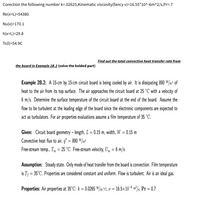
Elements Of Electromagnetics
7th Edition
ISBN: 9780190698614
Author: Sadiku, Matthew N. O.
Publisher: Oxford University Press
expand_more
expand_more
format_list_bulleted
Concept explainers
Question
Find out the total convective heat transfer rate from the board in Example 2B.2 (solve the bolded part) Example 2B.2:

Transcribed Image Text:Corection the following number k=.02625,Kinematic viscosity(fancy v)=16.55*10^-6m^2/s,Pr=.7
Re(x=L)=54380
Nu(x)=170.1
h(x=L)=29.8
Ts(1)=54.9C
Find out the total convective heat transfer rate from
the board in Example 2B.2 (solve the bolded part)
Example 2B.2: A 15-cm by 15-cm circuit board is being cooled by air. It is dissipating 890 W/m² of
heat to the air from its top surface. The air approaches the circuit board at 25 °C with a velocity of
6 m/s. Determine the surface temperature of the circuit board at the end of the board. Assume the
flow to be turbulent at the leading edge of the board since the electronic components are expected to
act as turbulators. For air properties evaluations assume a film temperature of 35 °C.
Given: Circuit board geometry – length, L = 0.15 m, width, W = 0.15 m
%3D
%3D
Convective heat flux to air, q" = 890 W/m²
%3D
Free-stream temp., T = 25 °C. Free-stream velocity, U» = 6 m/s
Assumption: Steady state. Only mode of heat transfer from the board is convection. Film temperature
is T¡ = 35°C. Properties are considered constant and uniform. Flow is turbulent. Air is an ideal gas.
Properties: Air properties at 35°C: k = 0.0265 W/m°C; v = 16.5×10-6 m²/s; Pr = 0.7
%3D
Expert Solution
This question has been solved!
Explore an expertly crafted, step-by-step solution for a thorough understanding of key concepts.
This is a popular solution
Trending nowThis is a popular solution!
Step by stepSolved in 3 steps with 4 images

Knowledge Booster
Learn more about
Need a deep-dive on the concept behind this application? Look no further. Learn more about this topic, mechanical-engineering and related others by exploring similar questions and additional content below.Similar questions
- 5.10 A flaked cereal is of thickness 2L = 1.2 mm. The density, specific heat, and thermal conductivity of the flake are p = 700 kg/m³, cp = 2400 J/kg K, and k = 0.34 W/mK, respectively. The product is to be baked by increasing its temperature from T₁ = 20°C to T, = 220°C in a convec- tion oven, through which the product is carried on a con- veyor. If the oven is L₁ = 3 m long and the convection heat transfer coefficient at the product surface and oven air temperature are h = 55 W/m² K and T. = 300°C, respectively, determine the required conveyor velocity, V. An engineer suggests that if the flake thickness is reduced to 2L = 1.0 mm the conveyor velocity can be increased, resulting in higher productivity. Determine the required conveyor velocity for the thinner flake. 2L = 1.2 mm Conveyor belt Cereal product V L₂ Oven h = 55 W/m².K T_= 300°Carrow_forwardNote:- • Do not provide handwritten solution. Maintain accuracy and quality in your answer. Take care of plagiarism. • Answer completely. • You will get up vote for sure.arrow_forwardDue higher viscosity, the heat-transfer coefficient of moving liquid hydrocarbons is generally higher than that of moving water Select one: O True O False The proper strategy to enhance heat transfer of a heat exchanger is trying to increase the heat transfer coefficient of the side with the lower heat resistant. Select one: O True O False For the universal 3-D heat transfer equation (see topic 7 in URCourses notes), we have to simplify by eliminating terms that are zero or near zero first, and then we can only use numerical methods (such as finite difference) to solve those problems. Select one: O True O Falsearrow_forward
- b Estimate the radius of the cylindrically shaped crater that such a comet strikes the Moon. Assume that the crater, of depth 10 km, is formed by heating to 3,500 K, and thus vaporizing, a cylindrical volume of moon rocks. Moon rocks are made of silicates, which have molecular weights of ~ 30 (i.e., m cm°. Ignore the latent heat required to melt and vapourize the rocks, and the energy involved in vapourizing the comet itself. creates when it 30 mH), and mean solid densities p ~ 2 g/ ~arrow_forwardPlease help. I am not sure how to approach this problem. This problem involves heat transfer and internal flow within a retangular channel. Thank you.arrow_forward6. Beginning with the equations on page 3, show the detailed steps needed to obtain the equation on p. 8.arrow_forward
arrow_back_ios
arrow_forward_ios
Recommended textbooks for you
 Elements Of ElectromagneticsMechanical EngineeringISBN:9780190698614Author:Sadiku, Matthew N. O.Publisher:Oxford University Press
Elements Of ElectromagneticsMechanical EngineeringISBN:9780190698614Author:Sadiku, Matthew N. O.Publisher:Oxford University Press Mechanics of Materials (10th Edition)Mechanical EngineeringISBN:9780134319650Author:Russell C. HibbelerPublisher:PEARSON
Mechanics of Materials (10th Edition)Mechanical EngineeringISBN:9780134319650Author:Russell C. HibbelerPublisher:PEARSON Thermodynamics: An Engineering ApproachMechanical EngineeringISBN:9781259822674Author:Yunus A. Cengel Dr., Michael A. BolesPublisher:McGraw-Hill Education
Thermodynamics: An Engineering ApproachMechanical EngineeringISBN:9781259822674Author:Yunus A. Cengel Dr., Michael A. BolesPublisher:McGraw-Hill Education Control Systems EngineeringMechanical EngineeringISBN:9781118170519Author:Norman S. NisePublisher:WILEY
Control Systems EngineeringMechanical EngineeringISBN:9781118170519Author:Norman S. NisePublisher:WILEY Mechanics of Materials (MindTap Course List)Mechanical EngineeringISBN:9781337093347Author:Barry J. Goodno, James M. GerePublisher:Cengage Learning
Mechanics of Materials (MindTap Course List)Mechanical EngineeringISBN:9781337093347Author:Barry J. Goodno, James M. GerePublisher:Cengage Learning Engineering Mechanics: StaticsMechanical EngineeringISBN:9781118807330Author:James L. Meriam, L. G. Kraige, J. N. BoltonPublisher:WILEY
Engineering Mechanics: StaticsMechanical EngineeringISBN:9781118807330Author:James L. Meriam, L. G. Kraige, J. N. BoltonPublisher:WILEY

Elements Of Electromagnetics
Mechanical Engineering
ISBN:9780190698614
Author:Sadiku, Matthew N. O.
Publisher:Oxford University Press

Mechanics of Materials (10th Edition)
Mechanical Engineering
ISBN:9780134319650
Author:Russell C. Hibbeler
Publisher:PEARSON

Thermodynamics: An Engineering Approach
Mechanical Engineering
ISBN:9781259822674
Author:Yunus A. Cengel Dr., Michael A. Boles
Publisher:McGraw-Hill Education

Control Systems Engineering
Mechanical Engineering
ISBN:9781118170519
Author:Norman S. Nise
Publisher:WILEY

Mechanics of Materials (MindTap Course List)
Mechanical Engineering
ISBN:9781337093347
Author:Barry J. Goodno, James M. Gere
Publisher:Cengage Learning

Engineering Mechanics: Statics
Mechanical Engineering
ISBN:9781118807330
Author:James L. Meriam, L. G. Kraige, J. N. Bolton
Publisher:WILEY